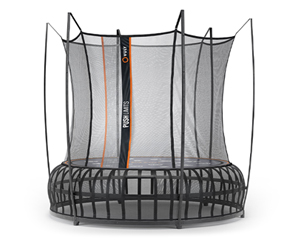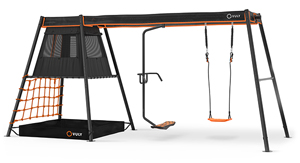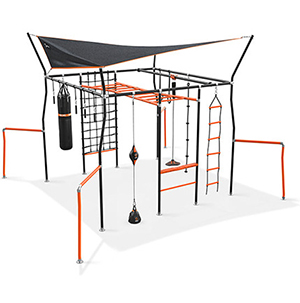
When it comes to combining outdoor fun and fitness, trampolines are a standout choice. Not only are they a source of fun, but they offer numerous health benefits, including improved cardiovascular fitness, better balance, and enhanced coordination.
However, before you go ahead and make a purchase, one choice you have to make is whether you should opt for an in-ground trampoline or an above-ground trampoline.
In-Ground Trampolines
An in-ground trampoline sits level with the ground, so it blends in with your yard. Unlike traditional above-ground trampolines, it requires a hole to be excavated where the trampoline will be placed. The installation takes some work, but when it's done, it looks great and fits seamlessly into your outdoor space.
This is one of the most attractive aspects of an in-ground trampoline - its visual integration into your outdoor space. Unlike above-ground trampolines, which stand out due to their height and large frames, in-ground versions blend seamlessly with the surrounding landscape. This creates a more aesthetically pleasing environment, allowing your garden or yard to maintain its natural beauty.
In-ground trampolines are easier to access for young children and people with mobility issues compared to above-ground trampolines. This is because they are level with the ground and do not require a ladder or steps to climb up onto the trampoline. This makes it easier for young children to get on and off the trampoline without the risk of falling or injuring themselves. Additionally, for people with mobility issues, it can be challenging to climb up onto an above-ground trampoline. In-ground trampolines eliminate this issue and provide a safer and more accessible option.

Above Ground Trampolines
Above-ground trampolines are standalone structures that sit directly on the surface of your backyard or garden. These are the trampolines most of us are familiar with, featuring metal legs and frames that elevate them above the ground. Many models are also equipped with safety nets and padded covers for added protection. Their affordability and convenience of assembly have made them the trampoline of choice for many families.
Installation is one of the most significant advantages of choosing an above-ground trampoline. These units are generally designed for simplicity and are often suitable for DIY assembly. This is especially advantageous if you're looking for a simple option that doesn't require much professional installation, saving both money and time.

In-Ground Vs Above-Ground Trampolines - Which Is Better?
Understanding the unique pros and cons of in-ground and above-ground trampolines will enable you to make an informed choice that best suits your family's needs, lifestyle, and budget.
Here are some important considerations:
1. Placement
The placement of an in-ground trampoline requires significant preparation and planning. You'll need a flat area of your yard where the trampoline can be safely installed. Additionally, you have to be conscious of underground utilities and must assess the soil type for its suitability for excavation. Once installed, the in-ground trampoline will be a permanent fixture, impacting your landscaping design.
Above-ground models offer more flexibility when it comes to placement. You can choose to place it in different parts of your yard and even move it seasonally if you wish. However, you'll still need a level area that can accommodate the trampoline's dimensions, and you should anchor it to ensure stability.
2. Price
In-ground trampolines typically come with a higher initial price, along with extra expenses for tasks like excavation and soil testing. The higher initial cost of in-ground trampolines can be offset by their durability and longevity. In-ground trampolines are built to last and are less likely to be damaged by weather or wear and tear; however, soil and drainage factors may cause corrosion over time. Depending on their installation, they may require less maintenance and repair over time, which can save money in the long run.
On the other hand, above-ground trampolines are usually more budget-friendly and can be free of installation costs if you opt for self-assembly. Even premium models equipped with advanced safety features and superior durability tend to be more affordable than in-ground options. Premium models often feature rust and UV-resistant coatings which can improve their longevity.
3. Safety
In-ground trampolines, being level with the ground, inherently minimize the danger associated with high falls, thereby providing a safer bouncing experience. However, it's important to note that many in-ground models lack built-in safety nets.
While being elevated does introduce a higher risk in case of falls, modern above-ground trampolines often come with robust safety features like protective nets and cushioned padding to mitigate this risk.
4. Installation
The installation of in-ground trampolines tends to be complicated, time-consuming, and usually requires professional help. Factors like soil and drainage must be considered to prevent water from pooling underneath the trampoline.
In contrast, setting up an above-ground trampoline is typically a more straightforward process, often manageable as a do-it-yourself project. While larger models might require additional assistance for assembly, specialized skills are generally not required. Furthermore, drainage concerns are usually less pertinent for these above-ground variants.
5. Longevity and Maintenance
In-ground trampolines may demand more intensive, ongoing maintenance, particularly due to potential challenges like drainage complications or degradation from soil and environmental factors.
Above-ground models, like Vuly trampolines, are more durable and easier to maintain. Despite being exposed to the elements, their elevated position makes them more accessible for routine upkeep and any necessary repairs.
Taking into account the implications of placement, the substantial costs, the safety features, and the complexity of implementation, above-ground trampolines often stand out as the more practical and cost-effective choice. They offer easier and cheaper installation, greater flexibility in placement, and have become safer over the years with advancements in design. While in-ground trampolines do present an aesthetic advantage and a slightly safer profile, the costs and logistical challenges involved in setting one up often outweigh these benefits.
Therefore, unless you have specific requirements that can only be met by an in-ground trampoline, an above-ground trampoline is likely the more economical and secure option. As you prepare to make a choice between an in-ground or above-ground trampoline, consider all these factors holistically to ensure you are not just buying a trampoline, but investing in a lasting source of enjoyment and well-being for your family.







































